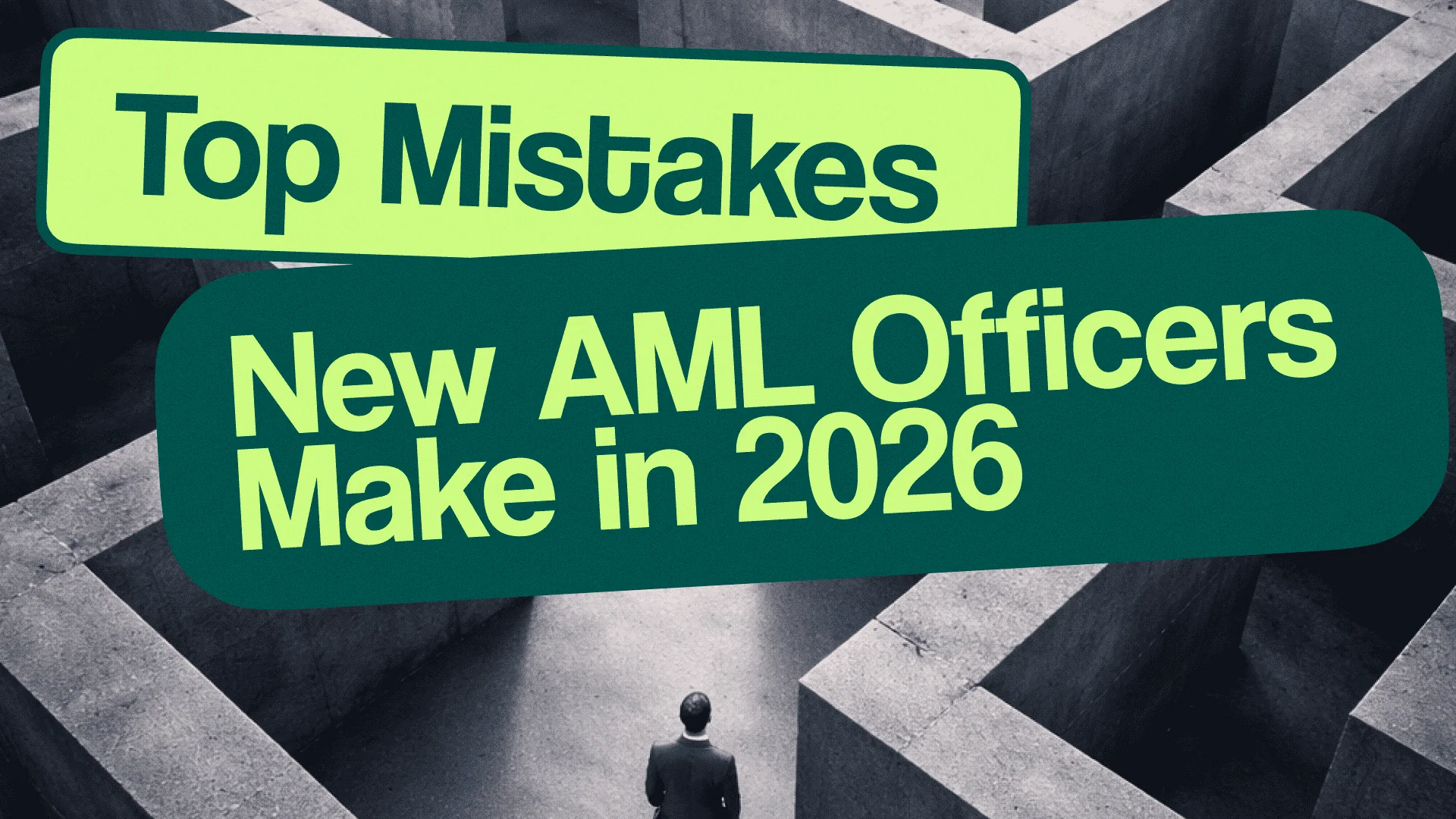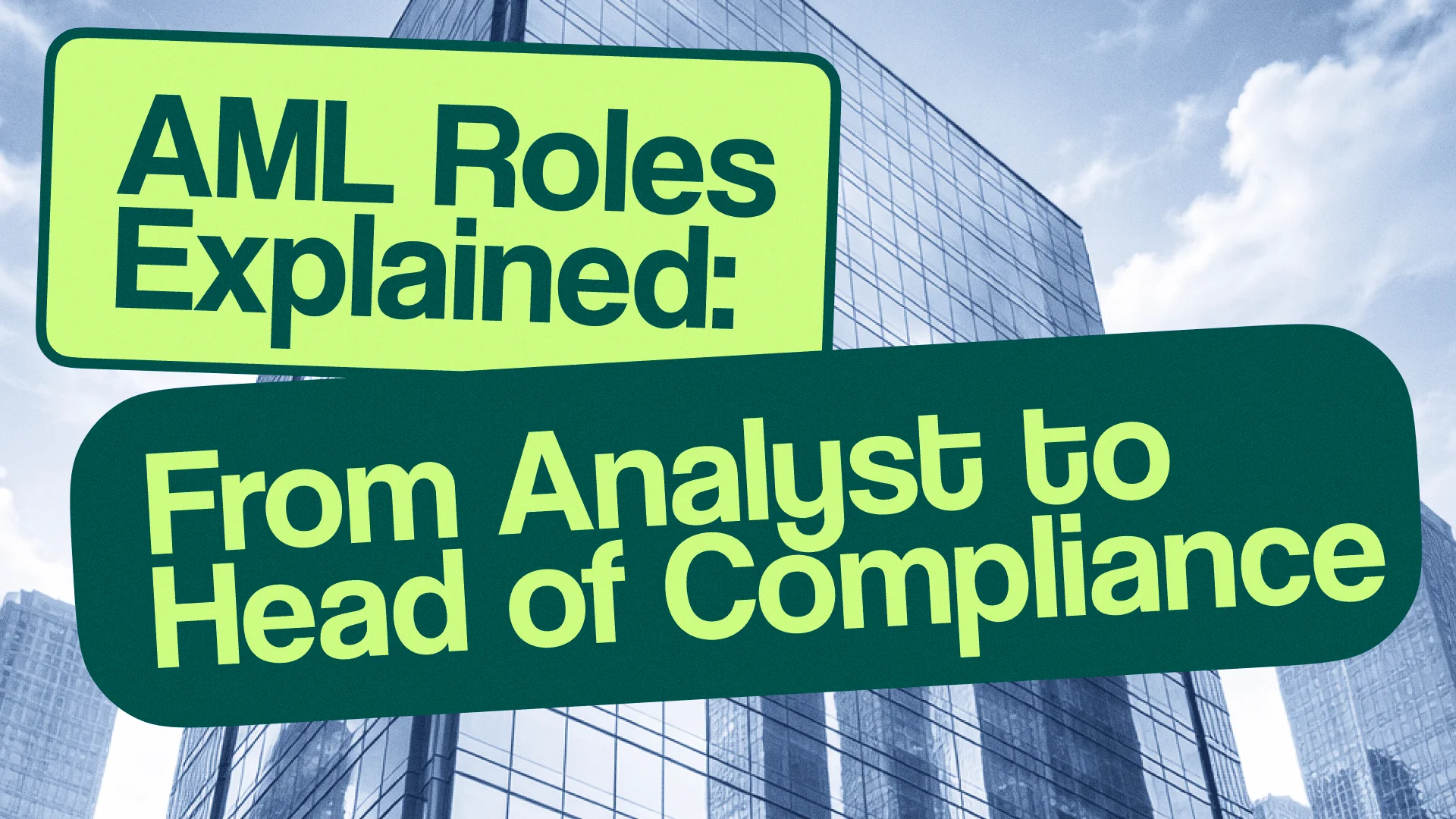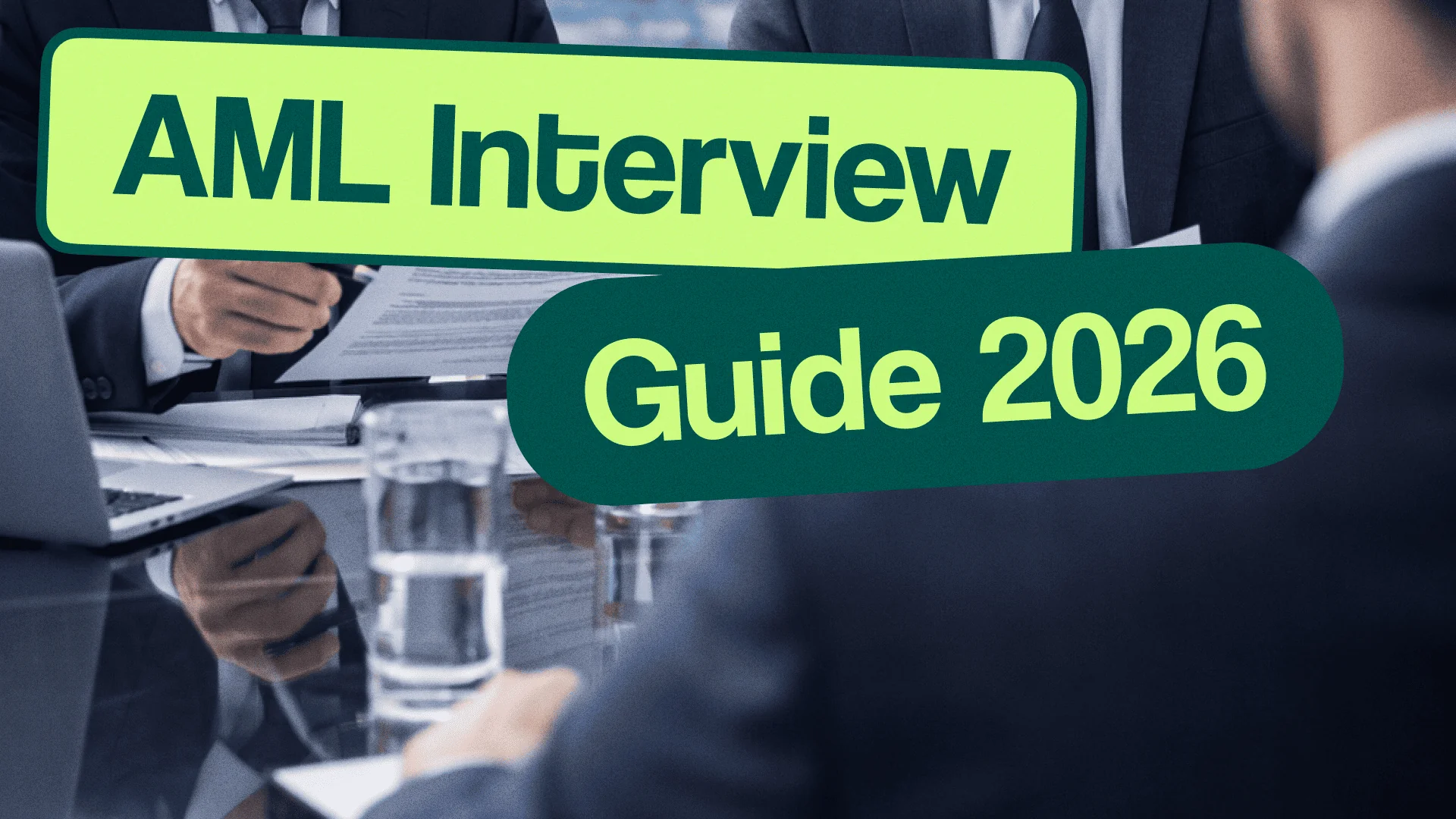The AML job market will stop behaving politely after 2025.
Salary charts will flatten, then bend. Some roles will stall. Others will jump in short, sharp steps. Titles will start to matter less than scope, and responsibility will begin to price itself more aggressively.
The demand for Anti-Money Laundering (AML) specialists will surge due to stricter regulations and rising financial crimes. To meet these challenges and enhance skills, professionals can explore certification programs like the AML Foundations Course. This will be attributed to the stricter laws and increasing number of financial offences. Financial institutions will require additional professionals who can assist them in following these guidelines and guard against illicit actions. Consequently, AML specialists’ salary rates will be on increase as a result of such high demand; firms will be ready to pay more to ensure safety.
We think this shift will catch many specialists off guard. For years, AML pay followed a fairly predictable rhythm. Add experience, move jurisdictions, collect one more certification, expect a steady bump. That rhythm will break.
Between 2026 and 2028, salaries will not simply “increase”. They will re-sort.
This article looks at how and why that will happen. Not in abstract terms, not through generic averages, but through roles, timelines, jurisdictions, and the real pressure points that will push compensation upward.
Executive Salary Snapshot: AML Pay in 2026–2028
If we compress the market into one frame, here is what it will look like.
AML salaries in 2026–2028 will move into wider bands, with sharper gaps between median and top earners. Entry-level pay will rise modestly. Mid-level compensation will expand unevenly. Senior and liability-bearing roles will absorb the strongest growth.
Experience will remain a major determinant of an AML specialist’s salary. Entry-level specialists with 1-4 years’ experience can expect to earn about $65 000 per annum on average. Those with 5-9 years’ experience will receive more, earning around $71,000 annually, whereas professionals will acquire further skills in continuous learning and skill development that make them valuable to employers and improve their income.
Experience will improve problem-solving abilities, knowledge of complicated AML rules, and capabilities to do intricate financial investigations. Senior roles with higher responsibilities and higher payment will usually fall to seasoned experts who have proven themselves worthy of the trust of their organisations.
Global AML Salary Ranges (2026–2028)
| Role | Low | Median | High |
| AML Analyst | $58k | $72k | $95k |
| AML Specialist | $65k | $85k | $120k |
| Senior AML / Manager | $95k | $120k | $160k+ |
| AML Consultant | $90k | $130k | $180k+ |
| Head of AML / MLRO | $120k | $160k | $220k+ |
These numbers will matter less as fixed points and more as signals.
The median will tell us where most of the market will sit. The high end will tell us where pressure will accumulate. The distance between them will tell us how selective the growth will become.
According to our analysts, the widening spread will reflect a simple truth: companies will no longer pay for AML presence. They will pay for AML ownership.
How AML Salaries Actually Changed After 2025
Many salary articles draw a straight line from one year to the next. That approach will miss the shape of what will happen after 2025.
The change will not arrive as a smooth incline. It will arrive as a reset, followed by uneven acceleration.
Why 2026 Became a Salary Reset Year
By early 2026, several forces will collide.
Regulators will increase scrutiny across payments, crypto, correspondent banking, and EMI structures. Enforcement actions will become faster. Penalties will grow heavier. Boards will start asking sharper questions, often uncomfortable ones.
At the same time, compliance teams will already be stretched. Hiring pipelines will lag behind regulatory expectations. Automation will help with volume, but it will not reduce accountability.
This will create a reset moment.
Companies will reassess what they are paying AML staff and why. Some will raise salaries across the board to stabilize teams. Others will target specific roles, pushing compensation upward only where risk will concentrate.
We think 2026 will mark the point where AML pay will stop being benchmarked against “compliance roles” and will start being benchmarked against regulatory exposure.
Why 2027–2028 Did Not Scale Evenly
After the reset, the market will fracture.
Junior roles will continue to grow, but slowly. Many firms will invest in tooling to handle basic reviews. Entry-level demand will remain, but wage pressure will soften.
Mid-level roles will experience selective growth. Specialists with narrow, operational skill sets will see limited upside. Specialists who can translate findings into decisions will see more movement.
Senior roles will break away from the pack.
Managers, MLROs, and consultants will absorb rising compensation as regulators will demand named accountability. The market will price in personal risk, reporting obligations, and decision authority.
This is why salary growth after 2026 will look uneven. It will reflect where liability will sit, not where headcount will sit.
Salary Growth by Role: Who Benefited and Why
Looking at AML salaries without separating roles will hide the real story. Growth will not distribute evenly. Some titles will gain status. Others will plateau.
Below, we break down how each major role will evolve between 2026 and 2028, and what will drive those changes.
AML Analysts: Controlled Growth, Fewer Shortcuts
AML analyst salaries will increase, but within boundaries.
Between 2026 and 2028, analysts will typically move from the mid-$50k range into the low-to-mid $70k range. High performers will cross into the $80k–$95k zone, though that will remain selective.
Why the restraint?
First, automation will reduce manual workload. Transaction monitoring systems will improve alert quality. Screening tools will filter noise more efficiently. Analysts will still matter, but volume alone will no longer justify pay jumps.
Second, analyst roles will become more standardized. Many firms will redesign analyst job descriptions to limit scope creep. Analysts will review. Seniors will decide.
This will create a ceiling.
Analysts who stay focused on review tasks will see stable, modest growth. Analysts who learn investigation logic, regulatory reasoning, or reporting will move beyond the analyst bracket altogether.
In short, the role will become a gateway, not a destination.
AML Specialists: The Real Winners of 2026–2028
AML Specialists will experience the strongest relative growth across the market.
Between 2026 and 2028, specialist pay will expand from roughly $65k–$85k into the $90k–$120k range, depending on scope and sector.
Why specialists?
Because the market will redefine what “specialist” will mean.
By 2026, AML Specialists will no longer be expected to only review cases. They will be expected to:
- interpret regulatory expectations,
- fine-tune monitoring logic,
- assess cross-border exposure,
- explain findings to non-compliance stakeholders,
- support audits and regulatory requests.
This shift will turn specialists into translators between systems, rules, and business decisions.
We noticed a clear pattern: specialists who combine operational AML skills with regulatory writing or control design will consistently cross higher salary bands.
Specialists who stay narrow will not.
Senior AML and Managers: Pricing Responsibility
Senior AML roles will absorb a different kind of growth.
From 2026 onward, managers and senior officers will carry explicit accountability. Job descriptions will start to include language around decision ownership, regulator engagement, and escalation authority.
Salaries will follow.
Median pay will move into the $115k–$130k range, with upper bands exceeding $160k in high-risk sectors. Consulting, crypto, and payments will push even higher.
This will not be about experience alone. It will be about exposure.
Managers will sign off on frameworks. They will approve risk ratings. They will answer regulator questions. Compensation will adjust accordingly.
We think this period will mark the moment AML management will become a risk-priced role, not just a seniority step.
AML Consultants: High Variance, High Upside
Consulting roles will show the widest salary spread.
Some consultants will remain near $90k–$100k, working on routine remediation or documentation projects. Others will move rapidly beyond $150k, driven by specialization and reputation.
What will separate them?
- experience with regulatory enforcement cases,
- ability to operate independently,
- sector focus,
- willingness to work in high-pressure timelines.
Consulting pay after 2026 will reward credibility more than tenure. A consultant who can step into a failing program and stabilize it will command a premium. One who cannot will remain interchangeable.
Heads of AML and MLROs: Liability Priced In
The top of the AML salary ladder will shift most dramatically.
Heads of AML and MLROs will see compensation move into the $160k–$220k+ range, with further upside tied to jurisdiction, firm size, and regulatory intensity.
The reason will be simple.
Regulators will increasingly name individuals. Enforcement actions will reference accountability roles directly. Boards will demand clear ownership. Insurance costs will rise.
Pay will adjust to reflect that personal exposure.
These roles will no longer resemble “senior compliance jobs”. They will resemble regulated leadership positions.
Geography Still Matters — But Differently
For years, AML salary discussions followed a familiar script. The United States paid more. Western Europe followed. Everyone else trailed behind. Remote work blurred some lines, but it did not erase geography. It reshaped it.
Between 2026 and 2028, location will stop being a simple multiplier and will start acting as a filter. Not every country will pay more. Not every city will justify a premium. Growth will concentrate where regulatory load, reporting depth, and enforcement exposure will increase at the same time.
Salary Ranges by Country (2026–2028)
| Country / Region | Typical Range |
| United States | $120K – $218K |
| Canada | $51K – $82K |
| United Kingdom | £25K – £42K |
| EU (average) | €58k – €62k |
| Ireland | €54K – €61K |
| Poland | PLN 72k – 204k |
| UAE | AED 84k – 204k |
| Singapore | $60k – $84k |
These ranges will reflect where AML specialists with 3–8 years of experience will typically land. Senior leadership will exceed them.
Why the US Stayed on Top
The US market will keep its lead for structural reasons. Federal enforcement will remain aggressive. Reporting obligations will stay dense. Large financial institutions will continue to absorb compliance costs rather than cut exposure.
Another factor will matter. US firms will increasingly hire AML professionals to manage international risk. Someone sitting in New York will often oversee flows touching Latin America, Europe, and Asia. That scope will price itself in.
Remote hiring will not reduce this premium. In some cases, it will reinforce it. US-based accountability will still carry weight even when teams are distributed.
Europe: Fragmented but Rising
Europe will tell a more complex story.
Some jurisdictions will stall. Others will accelerate. The difference will often come down to enforcement style and institutional expectations.
Ireland, for example, will continue to pay above the EU average due to its concentration of financial services and regulator engagement. Poland will emerge as a quiet growth market, driven by shared service centres evolving into decision centres.
We will notice that EU AML salaries will rise fastest where regulators will demand direct dialogue, not just documentation. Roles that involve cross-border reporting will pay more than those focused on local reviews.
Middle East and Asia: Selective Premiums
The UAE and Singapore will follow a selective pattern. Pay will increase sharply for specialists who understand cross-border flows, sanctions exposure, and correspondent banking logic.
Entry-level growth will stay moderate. Mid-to-senior specialists will benefit most.
In these markets, AML salaries will often reflect who the firm serves, not where the firm sits. A payments company operating globally will pay more than a local institution, regardless of location.
Remote Work Did Not Flatten Pay
Remote work will change hiring mechanics. It will not equalize salaries.
We will see firms hiring remotely while still paying “home jurisdiction” rates for accountability roles. Others will create two-tier systems: operational remote roles at one level, decision roles at another.
Remote AML specialists who combine technical skill with regulatory communication will benefit the most. Pure review roles will see less advantage.
What Actually Drives AML Salaries in 2026–2028
Salary growth does not happen by accident. It follows pressure.
Between 2026 and 2028, four forces will matter more than any others. Experience, skills, certification signaling, and regulatory exposure will interact in new ways.
Experience Isn’t Linear Anymore
Years alone will stop being a reliable predictor.
We will see specialists with three years of focused experience out-earning peers with eight years of narrow exposure. Employers will look for evidence of judgement, not time served.
Experience will accelerate salaries when it includes:
- regulator-facing work,
- audit response,
- escalation handling,
- framework design,
- cross-functional decision-making.
Experience will stagnate when it stays limited to repetitive review.
This shift will catch some professionals off guard. Longevity will matter less than trajectory.
Skills That Triggered Salary Jumps
Certain skills will consistently push compensation upward. Not because they sound impressive, but because they solve real problems.
Below is a list of skill areas that will drive salary growth, followed by explanation rather than buzzwords.
- Transaction monitoring design and tuning
Specialists who can adjust scenarios, explain false positives, and align monitoring with risk appetite will become indispensable. Firms will pay more for fewer alerts with higher quality. - Sanctions screening logic
Understanding ownership chains, name-matching pitfalls, and jurisdictional overlap will matter. Sanctions errors will carry immediate consequences. Specialists who reduce that risk will command higher pay. - Regulatory writing and reporting
Clear, defensible reports will save firms time during inspections. Professionals who write well will reduce friction. That skill will translate directly into salary growth. - Control design and gap assessment
Designing controls rather than following them will become valuable. This skill will bridge AML and governance, lifting specialists into higher bands. - Data literacy for compliance
Not advanced coding, but the ability to read patterns, question outputs, and explain anomalies. Firms will reward those who can interpret dashboards without being overwhelmed.
We think the common thread is simple. These skills reduce uncertainty. Markets pay to reduce uncertainty.
Certifications: When They Still Mattered
Certifications will not disappear from salary discussions. Their role will change.
By 2026–2028, certifications will rarely trigger automatic pay increases. Instead, they will act as credibility anchors.
Certifications will influence salary when:
- combined with relevant experience,
- aligned with sector focus,
- supported a role change or promotion.
They will matter less when stacked without context.
According to our analysts, CAMS and advanced AML credentials will still influence compensation in financial crime-heavy sectors. General compliance certificates will matter more when paired with leadership roles.
The market will stop rewarding certificates as checkboxes. It will reward them as signals.
Industry Differences: Where AML Pays More
Industry will become one of the strongest differentiators after 2026. Not all sectors will face the same scrutiny. Not all will absorb the same risk.
Salary by Sector (2026–2028)
| Sector | Pay Level |
| Banking | High |
| Fintech / EMI | High–Very High |
| Crypto / VASP | Volatile but Premium |
| Consulting | Highest upside |
| Insurance | Stable, lower ceiling |
| Payments | High |
Banking: Stable, Structured Growth
Banks will continue to pay well, though growth will stay measured. Strong frameworks will limit surprises. Salaries will rise through promotions rather than sudden jumps.
Senior banking roles will pay consistently, especially those tied to correspondent banking or international flows.
Fintech and EMI: Fast, Uneven Growth
Fintech salaries will move faster, but unevenly.
Early-stage firms will pay aggressively for specialists who can build AML frameworks from scratch. Mature firms will become more selective.
We will observe that fintech AML pay will reward versatility. Specialists who can move between product review, transaction monitoring, and regulatory reporting will earn more.
Crypto and VASP: Premium with Volatility
Crypto will remain the most polarized sector.
Some firms will pay exceptionally well, especially for specialists familiar with blockchain analytics and travel rule logic. Others will collapse or will freeze hiring entirely.
Pay will depend less on title and more on risk tolerance. Those who navigate this space well will earn premiums. Those who misjudge employers will pay the price.
Consulting: Ceiling Removed
Consulting will offer the highest upside and the widest variance.
Consultants who handle enforcement remediation, urgent audits, or cross-border expansions will earn well above market medians. Others will remain close to standard senior pay.
Reputation will matter more than employer name.
Insurance: Predictable, Limited Upside
Insurance AML roles will stay stable. Growth will occur, but ceilings will remain lower than in banking or payments.
For professionals valuing predictability over acceleration, insurance will remain attractive. For aggressive earners, it will not.
Why AML Salaries Rose Faster Than Other Compliance Roles
One question will keep appearing in salary data.
Why AML?
Why will AML roles outpace other compliance functions during the same period?
We see three reasons.
First, enforcement intensity will increase faster in AML than elsewhere. Financial crime failures will trigger immediate penalties. Other compliance breaches will often move slower.
Second, AML will combine operational complexity with personal accountability. Errors will affect not only firms, but named individuals.
Third, AML will sit at the intersection of regulation and technology. Automation will raise expectations rather than reducing pressure.
In simple terms, AML specialists will carry more risk per decision. Markets will price that risk.
Career Strategy: How AML Specialists Maximized Pay in 2026–2028
Between 2026 and 2028, salary growth will reward strategy more than effort. Long hours alone will stop producing results. Visibility, positioning, and timing will begin to matter just as much as technical strength.
We will observe several repeatable patterns among specialists who cross higher compensation bands. None of them will rely on shortcuts. Most will rely on deliberate moves that look conservative on the surface but pay off later.
Vertical Moves vs Horizontal Moves
Vertical promotion will remain the classic path. Analyst to Specialist. Specialist to Senior. Senior to Manager.
Yet the data will show that horizontal moves will often produce faster salary acceleration.
Specialists who move:
- from banking to fintech,
- from operations to investigations,
- from internal teams to advisory roles,
will often secure sharper pay jumps than peers who wait for internal promotions.
Why?
Because horizontal moves will reset benchmarks. A firm hiring externally will recalculate value. An internal promotion will often reuse existing salary logic.
That does not mean job hopping blindly. It means choosing moves that change scope, not just employer name.
Switching Jurisdictions Without Relocation
One of the quieter trends between 2026 and 2028 will involve jurisdictional exposure without physical relocation.
Specialists working remotely for:
- US-regulated firms,
- EU payment institutions,
- international crypto exchanges,
will often earn salaries aligned with regulatory scope rather than home country averages.
We think this will work when professionals demonstrate familiarity with specific regulatory environments. Firms will pay for understanding, not geography.
This strategy will fail when candidates try to stretch jurisdiction claims without real exposure. Hiring managers will test depth quickly.
When Staying Put Paid More Than Job Hopping
Not every success story will involve movement.
In firms facing regulatory pressure, internal AML specialists who stay will often benefit from urgency-driven pay adjustments. Enforcement actions, audits, or rapid expansion will force companies to stabilize teams fast.
In these moments, institutional knowledge will matter. Specialists who understand systems, customers, and legacy issues will become expensive to replace.
Staying will work when the firm faces pressure. It will not work in stagnant environments.
Common Salary Myths in AML (2026–2028 Edition)
Salary discussions will attract myths. Some will survive because they sound intuitive. Others because they used to be true.
Here are the most persistent ones — and what will actually happen.
“Crypto always pays more”
Sometimes yes. Often no.
Crypto roles will pay premiums when:
- firms operate across jurisdictions,
- compliance programs are immature,
- regulatory deadlines loom.
Crypto roles will pay poorly when:
- business models are unstable,
- compliance budgets shrink,
- firms shift from growth to survival.
Crypto pay will reward risk tolerance, not loyalty.
“Certifications guarantee higher salary”
They will not.
Certifications will help candidates enter conversations. They will not close negotiations. Experience, clarity, and confidence will.
Certifications will work best as support, not as leverage.
“Remote equals global pay”
Remote will expand access. It will not flatten compensation.
Firms will still pay based on:
- regulatory accountability,
- decision authority,
- reporting expectations.
Remote analysts will earn local-adjusted salaries. Remote managers will align closer to regulatory hubs.
“More years always mean more money”
This will stop being true.
Years will matter when they translate into judgement. They will matter less when they reflect repetition.
We will see younger specialists out-earn seniors when they handle escalations, audits, or regulator-facing work earlier.
What to Expect Next: AML Salaries After 2028
Predicting salary trends will always carry risk. Still, some patterns will appear durable.
We see three plausible directions.
Base Scenario: Slower but Selective Growth
In this scenario, AML salaries will continue to rise modestly. Entry-level roles will stabilize. Mid-level growth will narrow. Senior and leadership roles will maintain premiums.
Demand will remain steady due to enforcement pressure and regulatory complexity.
High-Pressure Scenario: Accelerated Senior Premiums
If enforcement intensifies or new regulatory regimes expand quickly, senior AML roles will absorb disproportionate growth.
In this case, MLROs, Heads of AML, and advisory specialists will see sharp increases. Junior roles will remain stable.
Efficiency Scenario: Skill Compression
If automation improves faster than expected, routine roles will compress. Salaries will shift toward specialists who combine AML with data interpretation, regulatory writing, or cross-functional oversight.
Pay will concentrate at fewer points.
According to our analysts, the most likely outcome will blend the first and third scenarios.
Growth will continue, but it will reward those who move beyond execution.
What This Means for AML Professionals
Between 2026 and 2028, AML salaries will tell a clear story.
Markets will stop paying for presence. They will pay for responsibility. They will pay for clarity. They will pay for professionals who reduce uncertainty.
The strongest salary growth will follow:
- decision-making authority,
- regulatory exposure,
- cross-border understanding,
- communication skill,
- calm judgement under pressure.
AML will remain one of the few compliance domains where technical knowledge, behavioural insight, and regulatory reasoning intersect daily. That intersection will carry value.
Summary
Salaries for AML specialists will increase between 2026 and 2028 not because the profession becomes fashionable, but because the cost of getting it wrong rises sharply. As enforcement tightens and accountability becomes more personal, the market will adjust. Pay will shift toward those who own decisions, handle scrutiny, and translate complexity into action. For professionals who recognize this shift early, compensation will follow. For those who do not, growth will slow. The difference will not be effort. It will be position.
As the world of finance keeps evolving technologically, however, it will be important for AML specialists to remain current on industry trends while engaging in lifelong learning initiatives so they can develop fully professionally, thereby maximising their earning potential.
As financial crimes grow more sophisticated, AML professionals will play a critical role in prevention, leading to rising salaries. Certifications like the Certified Anti-Money Laundering Senior Specialist can enhance expertise, helping specialists stay competitive in this evolving field.









